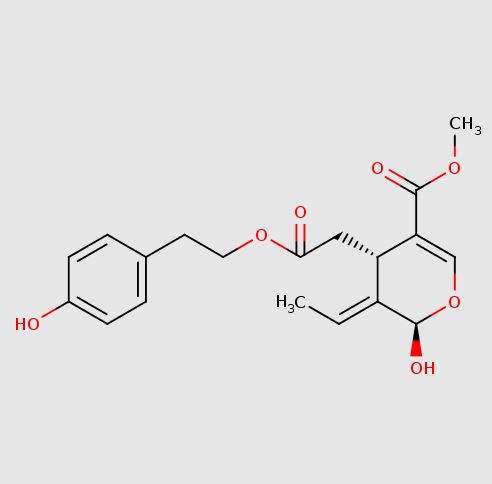Ligstroside aglycone
Ligstroside aglycone

Research and health effects of Ligstroside aglycone
Research on ligstroside aglycone itself is more limited than on oleuropein or hydroxytyrosol, but there are studies (in vitro, animal models, and some in humans) that suggest the following effects:
1. Antioxidant effect
Ligstroside aglycone can neutralize free radicals and reduce oxidative stress. This may contribute to the protection of LDL cholesterol against oxidation, an important step in the prevention of atherosclerosis.
2. Cardiovascular health
Research shows that olive polyphenols (including ligstroside aglycone) can improve endothelial function and have a blood pressure-lowering effect. The EFSA (European Food Safety Authority) has approved that olive polyphenols contribute to the protection of blood lipids against oxidative damage, although this is primarily attributed to hydroxytyrosol and its derivatives (including ligstroside aglycone).
3. Anticancer activity (preliminary evidence)
In cell and animal models, there are indications that ligstroside aglycone can contribute to the inhibition of tumor cell growth (e.g., breast cancer, prostate cancer). Possible mechanisms: inhibition of cell division, induction of apoptosis, and inhibition of inflammatory pathways that promote cancer development.
This is still preliminary and certainly not clinically confirmed in humans.
4. Neuroprotective effects
Some research suggests that ligstroside aglycone can contribute to protection against neurodegenerative diseases such as Alzheimer's.
It may inhibit or reduce the formation of amyloid-beta plaques in mouse models. This is consistent with epidemiological findings that an olive polyphenol-rich diet is associated with a lower risk of cognitive decline.
5. Anti-inflammatory effect
Like other polyphenols, ligstroside aglycone can suppress certain inflammatory mediators (e.g., COX enzymes, cytokines). This supports the hypothesis that it contributes to the low levels of inflammation characteristic of people who follow a Mediterranean diet.
Summary
Ligstroside aglycone is a polyphenol found in olive oil, closely related to oleuropein. Research suggests antioxidant, anti-inflammatory, cardiovascular, neuroprotective, and possibly anticancer effects. Most of the evidence comes from laboratory and animal studies. Human clinical evidence is indirect and often based on the consumption of whole olive oil, rather than isolated olive oil.

